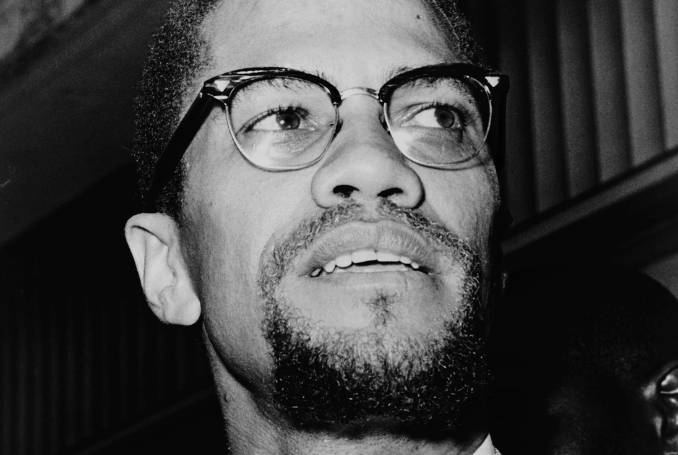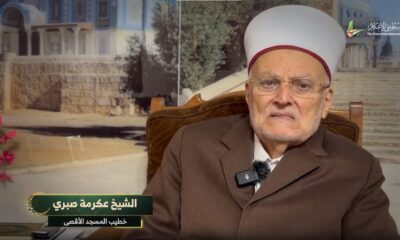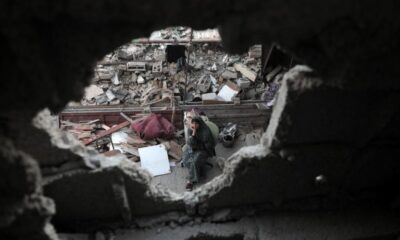Breaking News
Black Palestinian Solidarity: Race and Politics in the Holy Land and the Promised Land

On April 25th, President Joe Biden sent a congratulatory message to Israeli Prime Minister Benjamin Netanyahu on the anniversary of what Israel calls its “day of independence.” In it, Biden wrote that when Israel’s first prime minister, David Ben-Gurion, declared Israel’s independence in 1948, he announced the birth of a state “based on freedom, justice and peace.”
Biden, however, failed to note that Palestinians have had no freedom, justice and no peace since Israel was established (“independent”) on their land in 1948.
Palestinians have only known the Nakba (Arabic for catastrophe)—the tragic years since 1947 when Zionist forces violently expelled 750,000 of them from their homes and destroyed half of their towns and villages, and Israel’s continuing colonization of their homeland.
Israel’s current right-wing, ultra-Orthodox regime has finally exposed the supremacy and racism that is at the core of the country’s Zionist project. And Washington’s refusal to denounce it reflects on how deeply entrenched racism is in the United States.
The ideology of supremacy that runs through both countries is transparent.
Admittedly, the experiences of Black Americans and Palestinians are distinct, but the similarities are unmistakable. African American solidarity with Palestinians was recognized early on by their vanguard.
In his 1964 essay, “Zionist Logic,” Malcolm X called for the liberation of Palestine, writing: “The ever-scheming European imperialists wisely placed Israel where she could geographically divide the Arab world.”
In 1966, Black Panther Party founders stated the party’s opposition to all forms of racism, Zionism, colonialism and imperialism and called for the decolonization of Palestine. Party leader Huey P. Newton wrote: “Israel was created by Western imperialism and is maintained by Western firepower.”
Palestinian and Black Americans can find solidarity in their kindred struggle to end colonization, and to achieve equal civil, human and property rights and justice within the criminal and legal systems.
Since Israel was established, it has tried to claim all of Palestine and erase its indigenous population. It has worked diligently to fulfill the claim of Ukrainian-born, Golda Meir, Israel’s fourth prime minister, who in 1969 remarked: “There was no such thing as a Palestinian; they never existed.”
Netanyahu, as well as his predecessors, have said the same. In March 2023, for example, Israel’s far-right finance minister, Bezalel Smotrich, declared that there is no such thing as a Palestinian people, calling them an invented people. And parroting this racist trope, Florida governor, Ron DeSantis, during a recent visit to Israel, stated that “There’s never been a Palestinian Arab entity.”
In 2021, Human Rights Watch and Israeli B’Tselem concluded that Israel’s laws and practices meant to cement the supremacy of Jews over Palestinians is apartheid and that it is guilty of crimes against humanity under international law. Amnesty International, in its February 2022 report, stated that Israel is an exclusionary Jewish state that treats Palestinians as an inferior non-Jewish racial group.
In 19th and 20th century America, white Americans used lynching to terrorize, control and erase Black people. From 1882 to 1968, the recorded lynchings of Black Americans numbered 3,446. Jim Crow apartheid laws were enforced to maintain white supremacy, and racist stereotypes and caricatures were contrived to render Black American invisible, to deprive them of their humanity, and to lessen the guilt of enslaving other human beings for profit.
Both the United States and Israel were built on the establishment of land and property rights over human rights. They were constructed to serve, protect and expand the property rights (including the enslaved in the United States) of the settler-colonialists—white men in America and Jews in Israel-Palestine. Within these discriminatory economic systems, Palestinians and Black Americans have been treated as security problems and demographic obstacles to expansion.
Under the fig leaf of “reclaiming ancestral land,” Israel bulldozes Palestinian homes to make way for illegal Jewish “settlements.” Israel’s apartheid policies have forced Palestinians into ever-shrinking, tightly controlled militarized enclaves in the West Bank and East Jerusalem, over which they have no real authority.
Since 1948, Israel has destroyed more than 130,000 Palestinian homes and other structures (mosques, schools, reservoirs, etc.), displacing hundreds of thousands. Tel Aviv has used urban planning to transform East Jerusalem into a Jewish city. From 1967—when it was first occupied—to 2020, Israel has demolished an estimated 5,350 Palestinian homes in occupied East Jerusalem.
The destruction of entire neighborhoods, home demolitions and forced transfer of entire Palestinian populations by the Israeli state have been well documented by Amnesty International, B’Tselem, Human Rights Watch and other human rights organizations.
A recent example of Israel’s forced transfer policy involves the Palestinian Bedouin village of Khan Al-Amar. On April 30, the Israeli Supreme Court, which Israeli “democracy” protestors have been seeking to save, ruled that Khan Al-Ahmar will be razed to make way for Jewish “settlements.” The Israeli authorities have given the Palestinian villagers a choice of two relocation sites: one near the former Jerusalem municipal garbage dump, or a site in the area of a sewage plant near Jericho.
Like Israel’s apartheid practices, decades of US policies have trapped many Black Americans in segregated, poorly resourced and tightly policed communities, with little hope of escaping poverty. An “internally colonized” people is how the 1960s Student Non-Violent Coordinating Committee (SNCC) described America’s Black population.
In the 1950s and 60s, hundreds of Black neighborhoods were demolished to build highways and other “urban renewal” projects that largely benefited the cities’ white citizens. It is estimated that from 300,000 to 1.2 million Americans—disproportionally Black—were displaced to make way for development projects such as universities, hospitals and civic centers, like the Lincoln Center in New York City.
America’s largest removal project occurred in the West End of Cincinnati in the heart of the Black community—25,737 people (97 percent African American and low income) were forcefully removed. After razing over 2,000 structures, the city sold the property to private developers and constructed Highway I-75.
In the United States and Israel, law enforcement and the courts have been used to maintain supremacy. Palestinians and African Americans confront state-sponsored violence in many forms, including police harassment and brutality, extrajudicial killings, incarceration without trial and mass incarceration. Denied resources, rights, and over-policed, both are occupied communities. Institutionalized racism is explicit in the criminalization of both peoples, and unequal treatment exists at all levels of the legal and criminal justice systems.
The Israeli government’s widespread, arbitrary imprisonment of Palestinians evokes the mass incarceration of Black Americans. B’Tselem has reported that Palestinians have languished in prison without charges; and that each year, 500 to 700 Palestinian children are detained and prosecuted in Israeli military courts. The most common charge is stone throwing, which can carry a sentence of up to 20 years.
Like the Israeli national security state, US law and law enforcement have historically been use to control Black populations. The United States currently invests well over $100 billion annually on policing and over $90 billion on incarceration.
On April 27, 2021, The International Commission of Inquiry on Systemic Racist Police Violence Against People of African Descent in the United States concluded that the systematic killing by police of Black people constitutes a “prima facie case of crimes against humanity,” that should be investigated and prosecuted under international law.
African Americans are stopped, searched and arrested at rates higher than other racial groups. They are often targeted for low-level offenses or for minor misbehavior, which pose little or no harm to the community. It is not unusual for police to charge Black youth with loitering, trespassing or disorderly conduct. Minor traffic stops and other petty offenses have frequently escalated into deadly police violence.
The police killings of Eric Garner (New York) and Michael Brown (Ferguson, Mo.) during the summer of 2014, and Israel’s seven-week bombing assault on Gaza, further forged a bond of solidarity between Black and Palestinian activists.
During the Ferguson protests after Brown’s death, demonstrators held up signs declaring solidarity with the people of Palestine, with one Black marcher waving a flag that said, “this is our Intifada.”
It took a 9-minute video of the dehumanization and murder of George Floyd at the hands of the Minneapolis police in 2020 for the world to see and begin to grasp the structural racism embedded in American society. The institutional racism on which Israel was founded, and that is clearly obvious today in the extremist behavior of the Israeli state and its Zionist squatters, has yet to stir US outrage.
Israel’s apartheid practices have grown ever more institutionalized and cruel.
In the United States, racism, police brutality and the killing of Black Americans – Black men in particular—continues unabated.
James Baldwin poignantly observed that “Not everything that is faced can be changed, but nothing can be changed until it is faced.” To end the systemic injustices in Palestine and the United States, the racist ideology that buttresses the injustices must be faced.







